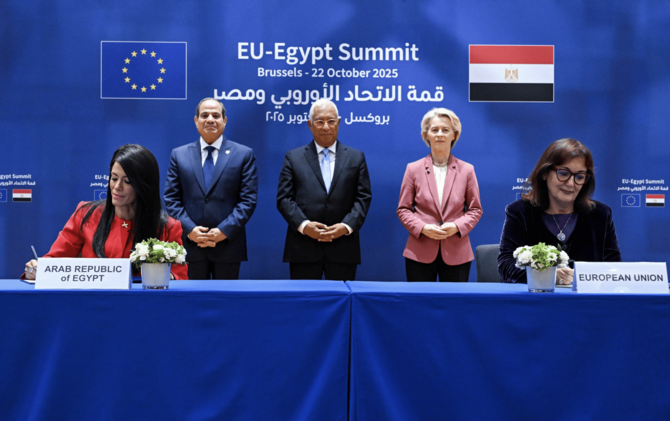
Egypt, EU Sign €4 Billion Agreement for Second Phase of Macro-Financial Assistance
The agreement aims to strengthen Egypt's macroeconomic resilience through structural reform matrix and budget support mechanism.
Riyadh - Egypt and the European Union (EU) have signed a €4 billion agreement to launch the second phase of the Macro-Financial Assistance (MFA) and Budget Support Mechanism, aimed at bolstering Egypt's macroeconomic resilience.
The signing took place during the Egyptian-European Summit in Brussels, with President Abdel Fattah El-Sisi, European Commission President Ursula von der Leyen, and European Council President Antonio Costa in attendance.
On the Egyptian side, the MoU was signed by Minister of Planning, Economic Development, and International Cooperation Rania Al-Mashat alongside Valdis Dombrovskis, European Commissioner for Economy and Productivity.
Al-Mashat stated that the MFA forms part of a broader partnership between Egypt and the EU, focusing on trade and investment ties to support fiscal stability and economic growth.
The agreement comes as Egypt recorded a historic high of $8.5 billion in dollar resources in July, reflecting improved economic indicators, including rising remittances from abroad.
Fitch Ratings affirmed Egypt's long-term foreign-currency issuer default rating at 'B' with a stable outlook in April, citing the country's large economy, potential gross domestic product growth, and support from bilateral and multilateral partners.
According to an official post on the Egyptian Prime Minister's Facebook page, Al-Mashat noted that the second phase, worth €4 billion, resulted from ongoing coordination between various national authorities and the European Commission throughout the year.
This involved reviewing a proposed structural reform matrix consisting of 87 reforms within the National Structural Reform Program.
The statement emphasized that these reforms aim to enhance macroeconomic stability and resilience, improve competitiveness and the business environment, and promote green transformation, including protecting the Red Sea ecosystem.
Al-Mashat highlighted that this partnership supports Egypt's ongoing economic reform efforts, enhances economic resilience in the face of external fluctuations, and helps the government extend debt maturities, improve sustainability, and bridge funding gaps.
The agreement underscores Egypt's commitment to economic diversification and strategic international collaboration as it continues implementing reforms to stabilize public finances and attract investment.
Egypt's economy has shown resilience despite global headwinds, with foreign investment and policy reforms helping offset volatile markets, according to Standard Chartered's August outlook.
The signing took place during the Egyptian-European Summit in Brussels, with President Abdel Fattah El-Sisi, European Commission President Ursula von der Leyen, and European Council President Antonio Costa in attendance.
On the Egyptian side, the MoU was signed by Minister of Planning, Economic Development, and International Cooperation Rania Al-Mashat alongside Valdis Dombrovskis, European Commissioner for Economy and Productivity.
Al-Mashat stated that the MFA forms part of a broader partnership between Egypt and the EU, focusing on trade and investment ties to support fiscal stability and economic growth.
The agreement comes as Egypt recorded a historic high of $8.5 billion in dollar resources in July, reflecting improved economic indicators, including rising remittances from abroad.
Fitch Ratings affirmed Egypt's long-term foreign-currency issuer default rating at 'B' with a stable outlook in April, citing the country's large economy, potential gross domestic product growth, and support from bilateral and multilateral partners.
According to an official post on the Egyptian Prime Minister's Facebook page, Al-Mashat noted that the second phase, worth €4 billion, resulted from ongoing coordination between various national authorities and the European Commission throughout the year.
This involved reviewing a proposed structural reform matrix consisting of 87 reforms within the National Structural Reform Program.
The statement emphasized that these reforms aim to enhance macroeconomic stability and resilience, improve competitiveness and the business environment, and promote green transformation, including protecting the Red Sea ecosystem.
Al-Mashat highlighted that this partnership supports Egypt's ongoing economic reform efforts, enhances economic resilience in the face of external fluctuations, and helps the government extend debt maturities, improve sustainability, and bridge funding gaps.
The agreement underscores Egypt's commitment to economic diversification and strategic international collaboration as it continues implementing reforms to stabilize public finances and attract investment.
Egypt's economy has shown resilience despite global headwinds, with foreign investment and policy reforms helping offset volatile markets, according to Standard Chartered's August outlook.











